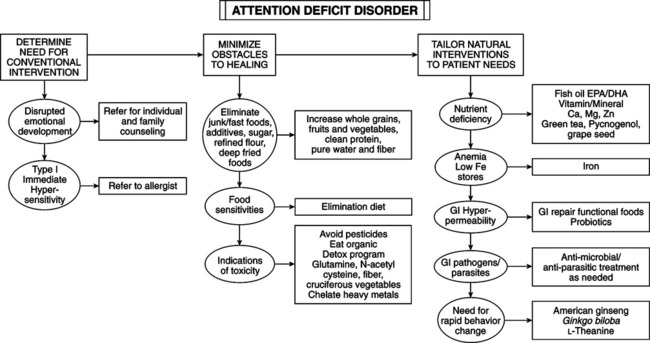• Essential fatty acids: ADHD children have reduced tissue docosahexaenoic acid (DHA). Brain essential fatty acids (EFAs) are critical in neuronal structure and function. Eicosapentaenoic acid (EPA), DHA, and arachidonic acid (AA) are components of brain and peripheral neuron structure, help normalize im-mune response, and regulate allergy and inflammation. DHA is crucial to fetal and childhood brain and retinal development. DHA levels are high at neuronal synapses, facilitating impulse transmission and neurotransmitter concentrations. Dopamine-producing nerve endings are 80% DHA. DHA is high in retina, supporting normal vision. DHA deficiency increases permeability of blood-brain barrier, critical to brain defense against neuro toxic xenobiotics. Primary effect of xenobiotics may be oxidative destruction and depletion of membrane EFAs. Bottle-fed children have twice the risk of developing ADHD as breastfed infants. Infant formulas do not provide DHA; breast milk contains DHA. Western diets are low in EFAs. ADHD children have impaired ability to synthesize DHA, AA, and gamma-linolenic acid (GLA) from vegetable oil precursors and increased oxidative destruction of omega-3 fatty acids. EFA deficiency is linked to diuresis and renal Ca loss. Increased thirst and enuresis associated with ADHD may be correctable by reducing food allergens. EFA deficiency in ADHD may be connected to food hypersensitivity. Atopy and food allergy require increased EFAs. Trans fatty acids arise from hydrogenation of vegetable oils, impair fetal/childhood brain development, and block enzymatic conversion of vegetable EFAs into GLA, AA, EPA, and DHA. • Magnesium: low in serum, red blood cells, and hair of ADHD children. Behavior improves when supplemented. • Zinc: children with low serum zinc (Zn) have lower free fatty acid levels, suggesting abnormalities in fatty acid metabolism may be liked to Zn deficiency. Low hair Zn correlates with poorer response to amphetamine treatment. Zn can reduce hy-peractivity. • Iron: helps regulate dopaminergic activity. Supplementating nonanemic ADHD children can diminish ADHD symptoms within 30 days. • B vitamins: low vitamin B1 levels have been observed in ADHD children. • Diet: improved behavior and school performance have been noted in children with a junk food diet—sucrose, artificial flavors, artificial colors, and preservatives—replaced by nutrient-dense foods. High glycemic diets correlate with high tissue cadmium and poor cognition in children. ADHD children have impaired catecholamine control of blood sugar with worsened behavior after sucrose challenge.
Attention Deficit Hyperactivity Disorder in Children
THERAPEUTIC CONSIDERATIONS
Environmental Neurotoxins
Nutrient Deficiencies
![]()
Stay updated, free articles. Join our Telegram channel

Full access? Get Clinical Tree


Attention Deficit Hyperactivity Disorder in Children

